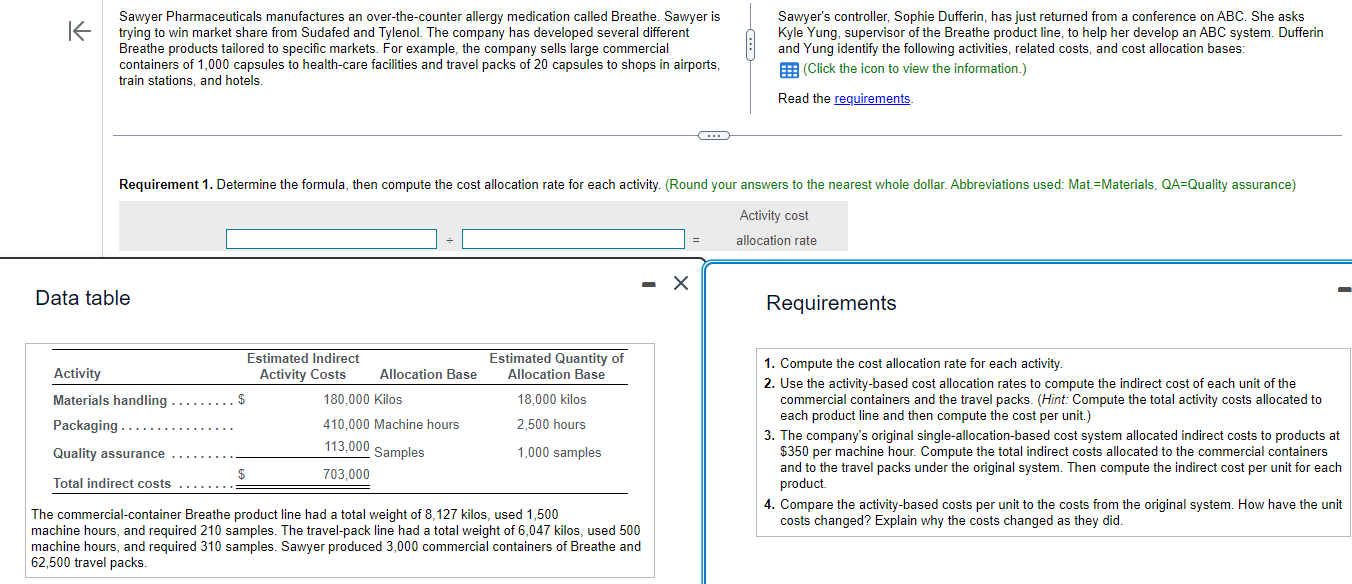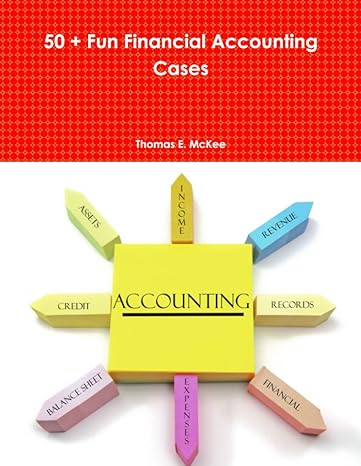Answered step by step
Verified Expert Solution
Question
1 Approved Answer
Sawyer Pharmaceuticals manufactures an over-the-counter allergy medication called Breathe. Sawyer is trying to win market share from Sudafed and Tylenol. The company has developed several
 Sawyer Pharmaceuticals manufactures an over-the-counter allergy medication called Breathe. Sawyer is trying to win market share from Sudafed and Tylenol. The company has developed several different Breathe products tailored to specific markets. For example, the company sells large commercial containers of 1,000 capsules to health-care facilities and travel packs of 20 capsules to shops in airports, train stations, and hotels. Sawyer's controller, Sophie Dufferin, has just returned from a conference on ABC. She asks Kyle Yung, supervisor of the Breathe product line, to help her develop an ABC system. Dufferin and Yung identify the following activities, related costs, and cost allocation bases: (Click the icon to view the information.) Read the requirements. Data table The commercial-container Breathe product line had a total weight of 8,127 kilos, used 1,500 machine hours, and required 210 samples. The travel-pack line had a total weight of 6,047 kilos, used 500 machine hours, and required 310 samples. Sawyer produced 3,000 commercial containers of Breathe and 62,500 travel packs. Activity cost allocation rate Requirements 1. Compute the cost allocation rate for each activity. 2. Use the activity-based cost allocation rates to compute the indirect cost of each unit of the commercial containers and the travel packs. (Hint: Compute the total activity costs allocated to each product line and then compute the cost per unit.) 3. The company's original single-allocation-based cost system allocated indirect costs to products at $350 per machine hour. Compute the total indirect costs allocated to the commercial containers and to the travel packs under the original system. Then compute the indirect cost per unit for each product 4. Compare the activity-based costs per unit to the costs from the original system. How have the unit costs changed? Explain why the costs changed as they did
Sawyer Pharmaceuticals manufactures an over-the-counter allergy medication called Breathe. Sawyer is trying to win market share from Sudafed and Tylenol. The company has developed several different Breathe products tailored to specific markets. For example, the company sells large commercial containers of 1,000 capsules to health-care facilities and travel packs of 20 capsules to shops in airports, train stations, and hotels. Sawyer's controller, Sophie Dufferin, has just returned from a conference on ABC. She asks Kyle Yung, supervisor of the Breathe product line, to help her develop an ABC system. Dufferin and Yung identify the following activities, related costs, and cost allocation bases: (Click the icon to view the information.) Read the requirements. Data table The commercial-container Breathe product line had a total weight of 8,127 kilos, used 1,500 machine hours, and required 210 samples. The travel-pack line had a total weight of 6,047 kilos, used 500 machine hours, and required 310 samples. Sawyer produced 3,000 commercial containers of Breathe and 62,500 travel packs. Activity cost allocation rate Requirements 1. Compute the cost allocation rate for each activity. 2. Use the activity-based cost allocation rates to compute the indirect cost of each unit of the commercial containers and the travel packs. (Hint: Compute the total activity costs allocated to each product line and then compute the cost per unit.) 3. The company's original single-allocation-based cost system allocated indirect costs to products at $350 per machine hour. Compute the total indirect costs allocated to the commercial containers and to the travel packs under the original system. Then compute the indirect cost per unit for each product 4. Compare the activity-based costs per unit to the costs from the original system. How have the unit costs changed? Explain why the costs changed as they did Step by Step Solution
There are 3 Steps involved in it
Step: 1

Get Instant Access to Expert-Tailored Solutions
See step-by-step solutions with expert insights and AI powered tools for academic success
Step: 2

Step: 3

Ace Your Homework with AI
Get the answers you need in no time with our AI-driven, step-by-step assistance
Get Started


